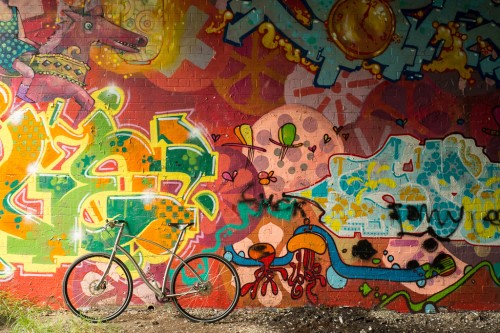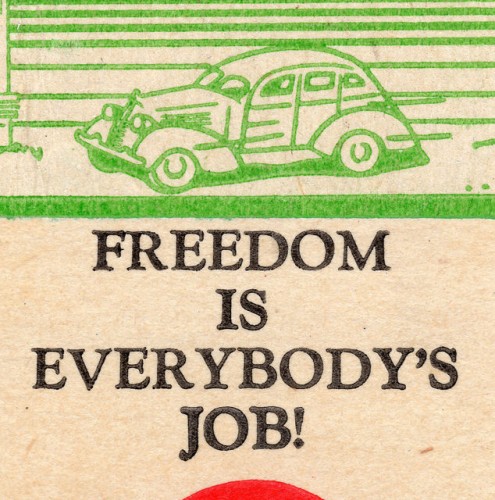
Paul Budnitz describes himself as a “serial entrepreneur” having created other companies that make artisanal toys and luxury bicycles. This is not the typical road bike most people have. He’s also the creator/founder/president/charismatic leader of Ello. And when a social network launches with a manifesto that proudly proclaims “You are not a product”, there’s more on the line than embedded video support. Despite the radical overtures of the initial launch, we shouldn’t expect any more from Ello than we would from a luxury bicycle.

By this I mean that it’ll be well-designed, fraught with race, class, and gender bias, and ultimately formed by the inevitable demands of capitalism. Just as more bikes in the world is better than more cars when it comes to concerns over the climate, Ello is probably better for the world than Facebook when it comes to issues of user control and (perhaps) privacy. Sure we should be concerned with how bikes and social media networks are made, but that doesn’t mean we shouldn’t stick our noses up at an intermediate step. Unlike more pure attempts like Diaspora or Crabgrass, Ello is a pleasure to use and very simple to set up.
Unsurprisingly, a lot of the critiques of Ello rely on comparisons to existing and defunct networks. As Natasha Lennard said, “To describe a site like Ello without referring to already existing social media platforms would be like trying to describe a new color — you couldn’t do it without talking about other colors.” If Ello were a color it would be white. Not only does Ello signal the zenith of the “more white space” design, its designers are white, and even their venture capital comes from the whitest state. That’s why I find it strange that lots of people are incensed that Ello is some kind of capitalist wolf in radical sheep’s (second hand, black wool hoodie) clothing.
Aral Balkan, a designer in the early stages of building a smartphone that “empower[s] users to own their data”, contends that by “taking venture capital you [Paul Budnitz] have made a crucial mistake that is incompatible with the goals you set out in your manifesto.” I really, really love Aral’s work (especially Experience-driven open), but if we’re gonna shit on Ello for taking VC money, we should also shit on his phone project because it says absolutely nothing about how, or where, or by whom it will be made. Just as Balkan doesn’t think Budnitz can make a progressive social network with VC funding, I don’t think Balkan can say his phone will “protect our fundamental freedoms and democracy” without giving lots of thought about sweatshop labor.
Then there’s the argument that Ello isn’t even worth considering because it is a “walled garden” and not a free software paradise where everyone can federate their servers and talk in encrypted emails all day. While I agree, in theory, that something like free software / open source software is the path to making truly democratic social networks, the big players in the free software community aren’t currently up to the task. They certainly aren’t bastions of acceptance or even tolerance, and their products are invariably harder to use. Who would want to spend their spare time reading a tutorial on how to use the thing that is supposed to distract them from work? Free software alternatives seem like a lot of work for not a lot of gain. I’d rather have responsive experts working on users’ concerns about accessibility and harassment prevention in the here and now than participating in an endless discussion of server ownership in service of an abstracted notion of freedom.
Thus, Ello isn’t a radical alternative to existing social networks. It won’t get to the root of our present problems with social media, but it might represent our latest and best hope for a social network that isn’t content with gaslighting their user base, relying on uninspired and exploitative revenue models, and enforcing rules that endanger marginalized people.
To put it simply, Ello is a luxury bicycle boutique, not an anarchist bike shop. Both offer an alternative to fossil-fuel based transportation, only the latter offers an alternative to capitalist modes of exchange as well. Diaspora is the closest thing we have to anarchist bike shop social media, and like the shop, is also a little more intimidating.
It’s pretty easy to dismiss a luxury bicycle boutique as nothing more than an extractive enterprise that relies on greenwashing to sell over-priced bikes to well-off Brooklyn hipsters. It’s all style and no substance. Those assholes are just buying (or getting invites codes for) their politics, they aren’t making the sorts of sacrifices necessary to live their politics. When an anarchist uses a bike as their primary means of transportation they are engaging in what Laura Portwood-Stacer in her book Lifestyle Politics and Radical Activism calls conspicuous anti-consumption. Whether its going vegan or refusing to own or regularly use a car, radicals often display their politics in the negative. By selectively but conspicuously not consuming they become living examples that a life without oil corporations and animal exploitation is not only possible, but doable.

Portwood-Stacer is also quick to point out that, “when an individual attempts to put anarchist principles into action in one’s everyday life, one acts on the assumption that one has the capacity to determine the shape of one’s personal experience.” Which is to say it is really hard to live your politics all the time, especially when it requires expertise or control over aspects of your life that most people delegate to companies or professionals. Building and maintaining your own bike is hard enough. Being deeply involved in the active maintenance of digital networks, where rarified expertise and expensive equipment is needed to keep things working smoothly, can be close to impossible. This a big reason why free and open software social media networks like Diaspora always have problems with keeping an active user base. Most people expect to use social media as a reliable means to talk to their friends, not as an ongoing development project.
As Quinn Norton rightly pointed out, with regard to Ello’s success “social networks are like languages — they are only worthwhile when they are broadly adopted.” That means a decentralized network like Diaspora, which asks you to choose among several installations with different features and performance rates, is a huge roadblock.
Beyond the melodrama of the Diaspora name –do we really need to equate leaving Facebook with the inter-generational violence wrought by colonialism, anti-semitism, and global capital?– it is also unclear as to whether Diaspora headaches offer the same benefits as the anarchist bike shop: do people actually feel more in control over the digital aspects of their lives? I suspect many would report “yes” but that seems like a selection bias more than an effect of the network. There’s a clear tension between democratic control, and democratic participation in social media. All of the things that make a social network easy to participate in – e.g predictable experience, user-friendly interfaces– generally come at the expense of user control.
What is largely missing from both the debate and the products that come from the radical software world is the importance of usability and pleasure. For instance, I wrote last week about my attempt to get rid of Dropbox because Edward Snowden told us it had a big open back door to the NSA. The presence of Condoleezza Rice on their board isn’t particularly wonderful either. It was hard to leave Dropbox, not just because the service is really useful, but because the alternatives are poorly designed. Secure services like SpiderOak focus their limited resources on their politics (security) but pay little attention to things like user interface design or documentation.

More times than not, doing something for your politics is a pain in the ass. Maybe you enjoy a good march or you genuinely love to code your own encrypted chat applications, but most of the time living your politics means giving something up or buying a more expensive version of a common good. There are precious few opportunities, especially for leftists, when living your politics means getting something better than everyone else. SpiderOak, Diaspora, and countless other projects seem just usable enough, but rely on your dedication to some other cause to make up for their obvious design problems.
Ello has the opposite problem. It is a social network built by designers for “people like them.” You could read this as “social media by foppish white dudes, for foppish white dudes” and you wouldn’t be wrong, but I think you’d also be missing something really important: Even if you’re not selling your users’ eyeballs the way Facebook or Twitter does, you’re still building a brand that’s mutually shaped by the users and your own marketing. Nothing about social media is “just marketing” because who you attract to use your service is part of the feature set. By making a social network with a manifesto, you get a social network filled with people that are at least attracted to the idea of a manifesto. Here’s where I think Ello can make an end-run around the control/participation tension. Attract people who are, in varying degrees, interested in control, but make a space that is fun and easy to participate in.
Further, and as Portwood-Stacer points out, participating in a lifestyle does not just follow from ideas, sometimes political orientations can be the result of participating in a specific community. Sometimes people engage in a political activity first, and develop a political orientation afterward. It doesn’t work for everyone, but it is probably better than shouting the common free software epithet RTFM (Read The Fucking Manual) at newcomers.
It’s a sort of politics of praxis. Ello as praxis encourages opportunities for behaving online in speculative, prefigurative ways. We can play with the form and affordances of the beta software by making long text posts about long text posts and filling our profiles to the brim with art that problematizes the ban on pornography [Early successes! NSFW content tags are in the works.]. By taking advantage of a network that has yet to become obdurate and institutionalized, and has some fairly receptive and talented people at the helm, I think there’s a very real opportunity for figuring out what we all want from our social media. Maybe then we’d all be a little more prepared to do the real heavy lifting of building a social network that doesn’t just conform to our politics, but actually generates and returns value in a socially just manner.
Ello, like a luxury bike, isn’t antithetical to capitalism and all of its problems. But it’s a step in the right direction, not just by being politically better than Facebook, but also being more useful and pleasurable than Diaspora. Ello’s core design team desperately needs some diversifying, and hopefully that and many other concerns of its users will alleviated sooner rather than later. This new network certainly isn’t the answer to every problem we have with private social networks, but it responds to some of the worst problems we face today. Ello might be a walled garden, but it’s fertile ground for growing something even better.

Comments 6
this is not a post about ello | orgtheory.net — September 30, 2014
[…] against upstart social media network Ello (if you haven’t been paying attention, see here, here, here) reminded me of something I was wondering a while […]
Ello: Neues soziales Netzwerk ohne Werbung und ungefiltert — October 1, 2014
[…] Hier der vollständige Artikel von Dave Winer. Ello: The Luxury Bicycle of Social Networks (Cyborgology) David A. Banks hat einen theoretischen Text geschrieben, in dem er Ello dafür wertschätzt, dass es in seinem frühen Beta-Stadium ein Ort ist, der noch uninstutionalisiert ist, und an dem es sich nach Belieben kreativ austoben und ausprobieren lässt, ohne dass es die Designmängel und komplizierte Handhabung der meisten von Verzichtsethik geprägten linken Alternativen teilt (zum Beispiel Spideroak oder Diaspora, mir fiele auch noch Tor ein): “Ello, like a luxury bike, isn’t antithetical to capitalism and all of its problems. But it’s a step in the right direction, not just by being politically better than Facebook, but also being more useful and pleasurable than Diaspora.” Hier zum Artikel im Cyborgology Blog. […]
Comradde PhysioProffe — October 6, 2014
I think one of the things that is so attractive about e-mail is that it has been fundamentally pretty much exactly the same since it was first invented. I started using e-mail back in the mid-1980s using some kind of text-only interface I don't even remember what it was called. If someone back then had put me in front of Gmail's current Web interface, it wouldn't have taken me more than a few minutes to figure out what was going on, as all the basic concepts remain the same: sender and recipient, inbox and other folders, re: lines, signatures, cc and bcc, etc.
Ello: Le vélo de luxe de réseaux ... — October 19, 2014
[…] Ello n'est pas une alternative radicale aux réseaux sociaux existants. Il ne sera pas aller à la racine de nos problèmes […]
Joseph Ratliff — October 20, 2014
What Ello did best (and is still doing best), is start the conversation we're having about Facebook and Ello.
It's a human experiment that will hopefully move us closer to the connection tool we want.
Until a billionaire can put their own money where the digital "mouth" is, and build an "Ello that doesn't need venture capital" ... and assuming that billionaire has genuine intentions, we're not going to get to full vision of Ello's "manifesto."
#holdingbreath :)
How To Select Remote Employees (Part 2) | Carear Work News — January 3, 2015
[…] then please feel free to comment. Via Recruiters.com by KAZIM LADIMEJ In this second part will continue exploring the the pros and cons of remote employees. This is the s…mote employees. The first article acknowledged the rise of telecommuting, e.g. Forrester Research […]